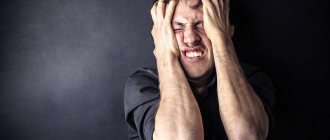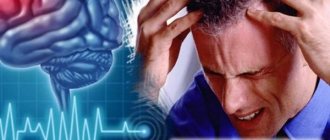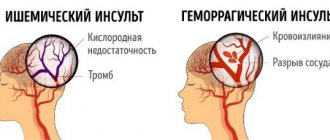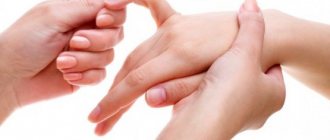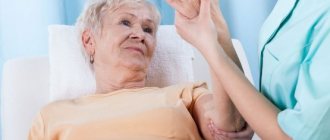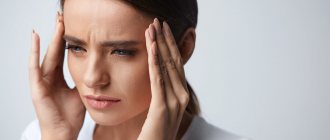Psychosomatics of stroke are two words that at first glance do not have much in common. The fact is that in traditional medicine, a stroke is considered to be a violation of blood circulation in the vessels of the brain. From a physiological point of view, the occurrence of disease is so. However, doctors are increasingly coming to the conclusion that stroke develops under a huge number of different factors, one of which is psychosomatics or the psychological state of a person. As a result of such problems, patients suffer from psychosis and a host of other psychological disorders. To understand the psychosomatic causes and consequences of an attack, it is necessary to consider the situation from different angles.
Briefly about the important, or get acquainted - stroke
During a stroke, the blood supply to an area of the brain is disrupted.
As a result, the blood vessels are affected, and the brain does not receive the necessary oxygen supply, and the nerve cells gradually die. Associated symptoms are:
- disorders of the motor system on one side;
- sensory disorders;
- lesions of central motor neurons;
- loss of consciousness;
- coma.
People of all ages are susceptible to stroke, especially those who suffer from heart disease and high blood pressure. The risk group includes patients with obesity, diabetes mellitus and those who abuse bad habits.
Micro-strokes foreshadow an upcoming brain catastrophe. You should pay close attention to the first symptoms, since even short-term vascular disorders lead to pathological changes in the brain substance.
Doctors can handle stroke treatment. Certain drugs restore damaged areas of nervous tissue and protect nerve cells from destruction.
However, complete recovery depends on the patient himself. Impaired brain circulation signals that you need to change your life, and not feel sorry for yourself.
Metaphysics of stroke according to Valery Sinelnikov
The famous Russian karma researcher Valery Sinelnikov notes in his books that a stroke most often arises from hatred and jealousy. Feelings literally strike a person and paralyze him, just as they do in the physical world.
Sinelnikov notes that in his practice he very often encountered people who led themselves to strokes and post-stroke paralysis through jealousy. Interestingly, medical statistics confirm this theory: there are more men among post-stroke paralytics. Based on the experience of personal practice, the researcher notes that many of those who approached him with this problem admitted to being very jealous of their wife.
Wrong way
Another karmic and psychological reason for a stroke is rejection of one’s own individuality, personal life path, destiny, if you like. A person’s inability or refusal to meaningfully change his life is spiritual paralysis. Here the metaphysical gradually grows and oppresses the physical - a stroke develops.
In this case, you need to delve into your thoughts, look for those in them that do not deprive you of freedom, paralyze, or lead you astray from the true Path.
Psychosomatic causes of stroke
It's no secret that health depends on a huge number of different factors. One of the causes of circulatory pathology in the brain is sensory perception.
The famous psychologist Louise Hay expressed the idea that the brain is a computer that controls the entire body. Contradictions that cannot be resolved can disrupt its work.
Psychosomatics identifies several main causes affecting the disruption of cerebral blood supply and the development of stroke:
- painful jealousy;
- doubts about fidelity, love;
- feeling of strong enmity and hatred;
- endless tension and the state of “everything needs to be done in time.”
Tormenting jealousy leads to disruptions in the nervous system.
The emotional cause of the disease is that a person has hopelessly lost the desire to do something. He doesn't enjoy anything and doesn't want anything. Life has lost its meaning for him.
Paralysis after a stroke is not uncommon. Suffering from this disorder are mainly those people who defend long-outdated views of the world. They are not flexible and cannot change to suit new circumstances. Accumulated aggression, the inability to perceive someone else’s opinion as correct, and to change one’s principles lead to dire consequences. This is a direct path to self-flagellation, which deprives you of the opportunity to be happy.
Fear is also one of the causes of illness. A person is afraid of losing something, of being left alone. So, for example, on the verge of divorce, having taken all measures to reunite and not finding the desired result, the brain digests the information and responds with hemorrhage.
Stroke, paresis and other neurological disorders according to Sinelnikov and illnesses from the mind according to Louise Hay:
What is psychosomatics?
The word psychosomatics in the medical community means the development of diseases, psychosis, and other pathological conditions that develop under the influence of a person’s psychological perception. We can say that all ailments in the body come from incorrect thinking; we ourselves attract them and contribute to their development. In fact, an experienced rehabilitation psychologist will say that many diseases occur not so much from an emotional state, but from mental health.
A person who is often subject to stress, depression, and easily moves into a state of aggression harms his body by subjecting it to constant “shocks.”
First of all, such manifestations of emotionality affect the functioning of the heart, blood vessels, and brain, but if a person has a disturbed psyche, damage is caused to the entire body as a whole. Moreover, there are many cases proving that psychosomatic disorders increase the chance of psychological complications after a stroke. In such cases, in addition to functional problems caused by poor circulation, a person faces the following troubles:
- dementia after stroke;
- depression;
- aggressive conditions;
- emotional imbalance.
Such complications not only complicate the rehabilitation process, but the very issue of recovery is jeopardized.
Due to the fact that the patient’s psyche is disturbed, his emotional state affects not only his health, it becomes a real test for loved ones, because they are the ones who experience the patient’s depressive, aggressive or other states.
Ways to Heal
By understanding the emotional causes of illness, you can recover faster and easier. Many people find it more convenient to take a couple of tablets and relieve themselves of pain symptoms. But the main reason remains in the head.
Psychologists say that there are diseases that can be cured only by working on your inner “I”. However, stroke requires a multifaceted approach, as a large number of vital systems in the body are involved.
Therapy consists of simultaneous influence on the physical and mental state. A specialized specialist can correct the consequences after a stroke. But at the same time, a good psychologist can return a person to a full life. It is necessary to identify the psychological cause of the disease. To do this, you need to remember your entire life before the brain stroke. Analyze events, thoughts, feelings and everything that this period was filled with.
The path to healing depends on the cause that provoked the disease. Sources of recovery include:
- forgiveness;
- awareness;
- repentance;
- relaxation.
Music lessons, art therapy, hobbies, walks in nature, and active recreation will help restore inner harmony.
Sometimes, in addition to psychological help, treatment with appropriate psychostimulants, antidepressants, and antipsychotics is required. In this case, the course and dosage are prescribed only by the treating neurologist after a series of diagnostic measures.
Psychosomatic consequences of stroke
As mentioned earlier, a person who has experienced a stroke also faces psychosomatic problems. This is not only due to pathological disorders caused in certain areas of the brain or manifestations of dementia. Loss of motor functions, inability to perform tasks that previously seemed simple, to take care of oneself, etc. All this makes the patient feel inferior, hence the following psychological problems appear.
Aggression after stroke
Often these behaviors are caused by lesions in the temporal lobe involving the parahippocampal or anterior cingulate cortex. In this case, patients experience psychosis and emotional imbalance. To get rid of such complications, sedatives may be required, but the most important thing is the understanding attitude of others and tolerance.
Depression after stroke
Another severe disorder, which is a certain type of psychosomatic complication. The reasons for its development are the same, but now, in addition to psychosis and anger, it is noticeable that the patient has become depressed, detached, there is a general deterioration of not only psychological, but also physical condition, dizziness. In such situations, in addition to the main treatment, the patient is prescribed antidepressants.
Dementia after stroke
This manifestation is difficult to consider as a consequence of psychotic problems; rather, it is a direct consequence of certain disorders caused by extensive damage. It is difficult to cure a person with such a diagnosis; means are used aimed at activating the work of brain neurons and stimulating mental activity, as well as a long course of therapy.
Read also: What is the danger of a soporous state?
Psychogenic dizziness
Such dizziness is direct evidence of certain disorders directly related to the psychological and mental state. Depending on the nature of the problem, both antidepressants and sedatives are used.
Mental disorders after a stroke are much broader in nature; the common pathological behavioral disorders of patients who have suffered an attack are listed above. In addition, if before the stroke the patient was susceptible to certain psychosomatic problems, the likelihood of their occurrence after the “stroke” increases significantly. What to do and how to act in such situations is decided by the attending physician, however, for full treatment, the help of more specialized specialists may be required, among whom should be a rehabilitation psychologist.
Interesting cases
Indifference and stroke ≠ laziness
One patient after a stroke developed an indifferent attitude towards his painful condition. He lay in bed for hours, mindlessly watching all the programs on TV. Those close to the patient believed that laziness was to blame and did not touch him.
But this condition is explained by damage to certain areas of the brain. And here, relatives must patiently encourage the victim to take action, try to induce a desire to move, and engage in self-care. As soon as the relatives gained patience and began to support the patient, he began to recover.
Love conquered the disease
Another interesting case is described by psychologists.
In one family, everything led to a breakdown in relationships. The husband's drunkenness, constant complaints against each other, quarrels, curses forced the wife to take the children and go to her mother.
After some time, she found out that her husband was in the hospital with a stroke and did not want to see anyone but her. His wife went to the hospital to see him, and the result was her husband’s recovery and family reunification.
Karmic causes of brain problems
The world-famous psychologist and researcher of the metaphysical laws of the body, Liz Burbo, claims that all diseases of the brain, from pain to strokes, thrombosis and hemorrhages, are the result of major problems with one’s own self. The metaphorical reference is obvious - beliefs, principles, thoughts and various attitudes are concentrated in the head . If it starts to get sick, a conflict grows in a person, destroying the personality.
Physiologically, the brain is very well protected, but a person is not always able to build the same mental and emotional defense of his own self. If this fails, there is a great risk of ceasing to be the master of one’s own will, of becoming a follower, dependent on someone else’s opinion or action.
Often people with a broken self have the goal of gaining approval from other people and are fixated on meeting their expectations. Even having achieved success in this, the person remains unhappy, since there is no understanding of his own place and purpose on Earth.
A person who has suffered a stroke or has learned that he is in danger of this terrible incident must find the way to his inner world as quickly as possible.
It is vitally important to realize that your current self-image is incorrect - it does not show the world who you really are. In fact, you have lost control over your entire life. It is necessary for the brain to once again become a tool for controlling the body, and for individual beliefs to determine the future path of life. Moreover, it should be closely linked with karmic destiny.
There is a high probability that the person himself will realize what spiritual and mental changes have become destructive. At a certain point in the past they were effective, but have lost their relevance. Stroke and other illnesses can be signals of the need to return to reality. To restore connection with your true personal essence, you can resort to karmic cleansing rituals.
